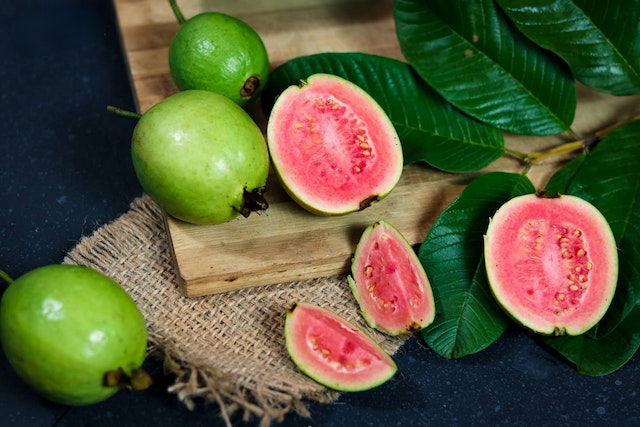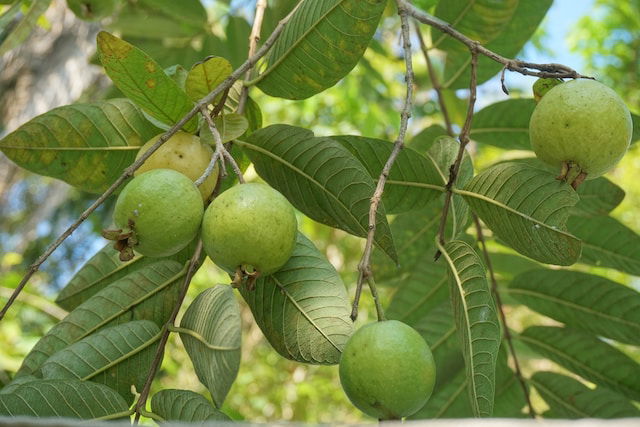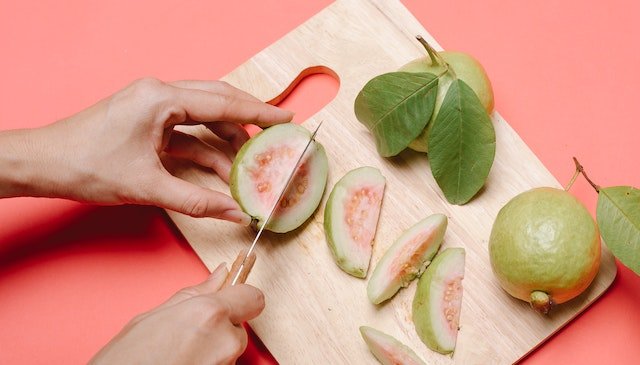We're an affiliate
We hope you love the products we recommend! Just so you know, we may collect a share of sales or other compensation from the links on this page at no additional cost to you. Thank you if you use our links, we really appreciate it!
When considering some dog-safe fruits to give your canine friend, you may have come across guava.
Can dogs eat guava? Is guava safe or dangerous for dogs? Before slicing this fleshy tropical fruit to serve your pup, beware of its safety, risks, and benefits.
Some dogs love eating fruits more than others, but you should only give them as snacks and not the main meal.
Follow along as we highlight the nutritional profile of guava and the safety considerations when feeding it to your dog.
Can Dogs Eat Guava?
Yes, dogs can have small portions of diced guava a few times a week. Guava fruits are safe for dogs as long as they eat them in moderation.
Guava, or any other fruit, should not replace your dog’s main diet. Dogs need a complete package of a well-balanced diet for their nutritional needs.
Small portions of diced guava can best be served to dogs as occasional treats or infused with the dog’s dry food to sweeten.
All guava types are safe for dogs to eat. Feel free to serve your pooch the different varieties including tropical white guava, apple guava, strawberry guava, pineapple guava, lemon guava, red guava, and Thai guava.
However, you should avoid giving your dog guava paste because it is very high in sugar.
Can We Give Guava to A Puppy?
Yes, puppies can eat small pieces of peeled guava once in a while. The risk of choking is higher in puppies, so you should remove all seeds and knife out the rind before serving.
Before Serving Your Dog Guava
Before giving your dog a chunk of guava fruit for the first time, make sure to consult with your vet for any possibilities of adverse effects or allergies.

Your vet will also advise you on the best time of year to offer this tasty treat to your dog and how to select the best ones for them.
The Nutritional Profile of Guava
Guava is a fruit grown in tropical and subtropical regions, known for its sweet flavor and colorful pulp when ripe.
Ripe guava is made up of an impressive nutritional profile, making it a perfect occasional treat to supplement your pup’s regular diet.
The fruit is low in fat and does not contain many calories. This makes guava a healthy choice for dogs who need a controlled diet for health reasons.
The primary composition of guava is 83% water, 15% carbohydrates, 2.58% protein, 3.0-5.5% crude fiber, 0.6% fat, vitamins, minerals, and antioxidants.
1. Vitamins
Guava fruit is packed with various types of vitamins including A, B, and C.
Vitamin A helps improve the dog’s vision in low-light conditions. It also aids in the formation of new white blood cells and promotes bone health.
Vitamin B in guava is found mainly as B3 and B6. Vitamin B3 (niacin) helps convert nutrients into energy and repair DNA.
Vitamin B6 (pyridoxine) on the other hand helps break down proteins into amino acids and supports brain function in dogs.
Vitamin C content in guava is roughly four times more than that in oranges. This is why most people call guava the ‘super fruit’.
Vitamin C strengthens the immune system in dogs in conjunction with other antioxidants.
This vitamin can also help your dog to relieve the effects of kennel cough and bacterial infections.
Vitamin K helps strengthen the bones to prevent fracturing and in the formation of healthy tissues.
It is also helpful in blood clotting. Vitamin K is mainly found in leafy green vegetables like collard greens.
2. Antioxidants
Guava fruit is rich in natural antioxidants such as carotenoids, which help eliminate free radicals in the dog’s body.
Free radicals can have damaging effects on the dogs’ body such as causing inflammation and chronic diseases like cancer.
The antioxidants in guava fruit are also beneficial in slowing down the aging process in dogs. This will help to keep your pup younger and active for a long period.
3. Fiber
Guava is packed with an estimated 5g of dietary fiber per 100g of fruit, which is significantly higher than many other fruits.
Fiber supports healthy digestion in dogs by preventing the overgrowth of bad bacteria in the digestive system.
Dietary fiber also supports regular bowel movements.
4. Potassium and Magnesium
Ripe guava fruit is amazingly rich in potassium, with the exact amount being 417 mg per 100 g of the fruit. Potassium helps dogs maintain a good electrolyte balance which then keeps organs in good working condition.
Potassium also helps in the digestive process of breaking down carbohydrates and healthy fats, supporting optimal nutritional uptake.
Magnesium is another mineral present in guava fruits. It helps absorb excessive potassium and zinc from the dog’s body.
Magnesium also helps relieve pain in dogs and supports cardiovascular and liver functions.
Are Guavas Toxic to Dogs?
Guava fruit is not toxic to dogs when consumed moderately as a random treat. This tropical fruit is packed with an impressive nutritional profile beneficial for dogs of all breeds.
If your dog eats too much guava fruit, they may suffer the risks of excessive sugar causing digestive problems and weight gain.
You should introduce the fruit slowly to your dog with small portions and observe how they react after a few minutes of ingestion.

Large quantities can induce toxicity
The amount of guava you offer your dog will depend on their size, weight, health condition, and tolerance to fruits.
Puppies and adolescents should be given smaller portions of guava while adult dogs can handle a slightly bigger serving.
Guava should be consumed as treats, meaning the fruit should not make up more than 10% of your dog’s daily food intake.
Potential Risks of Guavas for Dogs
Guava fruits are definitely a nutritional powerhouse and a tasty treat for most dogs. However, it’s important to be aware of potential risks associated with their consumption.
1. Dangers of sugar and carbohydrates
Guava is packed with natural sugars and carbohydrates, which are bad for dogs when consumed in excess.
While a small amount of sugar can be beneficial for providing energy, overindulgence may lead to adverse effects.
According to data from USDA, common guava fruit contains approximately 8.9g of sugar and 14g of carbohydrates per 100g.
Excessive sugar and carbs can contribute to weight gain or obesity which increases the risk of chronic illnesses.
If your dog is diabetic, we suggest that you avoid serving them guava without explicit advice from your vet.
2. Allergies
Stay close to your dog and monitor them for any negative reaction after feeding on guava. Guava fruits are not a common allergen for dogs, but remember that all dogs are individuals.
Dogs who are prone to skin sensitivities are at a higher risk of reacting negatively to guava. To be on the safe side, you should start with a small portion and observe how your pup reacts.
You should always monitor your dog’s response to new food and watch out for symptoms such as upset stomach, vomiting, diarrhea, or allergic reactions.
If your dog reacts negatively to guava, take them to the vet immediately for examination and prompt treatment.
3. Digestive issues
The fleshy part of guava is chock-full of fiber. Overeating guava can lead to digestive problems in dogs. Don’t get it wrong here, fiber is good for the dog’s gut health, but only in small amounts.
A fiber imbalance can cause cramping, gas, bloating, diarrhea, upset stomach, and an increased urgency to defecate.
4. Choking hazard
Guava skin, seed, and rind are not poisonous to dogs but they can cause choking. Removing seeds when preparing guava for dogs will also help in cutting down on sugar content.
Dogs love chewing, but they may not chew soft foods properly. Make sure to cut up the peeled guava into manageable sizes for your pup.
Large guava pieces may choke your dog when they try to swallow without proper chewing.
Benefits of Guava for Dogs
The fleshy part of guava is packed with a wide variety of nutrients and minerals to support your dog’s health.
We are talking about a rich nutritional composition of proteins, carbohydrates, dietary fiber, vitamin A, vitamin C, vitamin E, vitamin K, B vitamins, calcium, iron, magnesium, phosphorus, zinc, copper, and manganese.
The high fiber content in guava helps support the digestive system and gut health. Moderate the intake because too much fiber can cause the opposite!
Vitamin C in guava helps improve immunity against diseases, while vitamins A, K, and E are crucial in supporting vision, and bone health.
Ripe guava is packed with minerals such as potassium and magnesium which help in the proper functioning of various body organs.
How To Feed Guava to Dogs
#1: Wash the fruit thoroughly with clean running water to remove dirt, germs, and pesticide residues.
#2: Peel the fruit using a sharp knife then remove all seeds and the rind. Be careful in this step because guava contains too many seeds in a complex mixture with the rind.
#3: Cut the peeled fruit into small sizes (appropriate for your dog’s size) to prevent a choking hazard. Add the chunks to your dog’s food or offer them as treats.
3 Creative Ways of Giving Guava to Your Dog

1. Treats
When offering guava as an occasional treat, you can hand-feed your dog or put the small chunks in a puzzle feeder for mental stimulation.
2. Mix with other dog foods
Another nice way is to mix diced guava with your dog’s dry or wet food in a bowl. This helps to infuse the sweet guava flavor into bland food and boost nutritional uptake.
3. Frozen homemade treats
Blend the diced chunks with water and freeze the mixture in an ice cube tray for about 8 hours. You can treat your dog with these tasty frozen chunks during the hot summer months or stuff them in a Kong for added fun.
How Many Guavas Can a Dog Eat?
As we noted earlier, treats and snacks should only form about 10% of your dog’s daily food intake.
This does not mean that the entire 10% can be guava at any given time. That will be too much sugar, fiber, and carbs for your pup.
So, how many guava fruits can I give my dog? We recommend that you stick to a few small portions once a week for puppies and a couple more pieces for adult dogs.
Your dog should never eat a whole guava fruit on any particular day at a go.
Alternative Fruits That Are Safe for Dogs
If your dog isn’t interested in eating guavas, the following are some of the safe alternatives you can consider:
- Strawberries
- Cranberries
- Olives
- Raspberries
- Watermelon
- Blueberries
- Bananas
- Cantaloupes
- Peach
- Pineapple
- Plums
- Papaya
- Mango
- Kiwi
Frequently Asked Questions (FAQ)
1. Can dogs eat guava seeds?
Dogs should not eat guava seeds because they may cause choking. If your dog accidentally swallows some guava seeds, it should not cause major problems, but too much ingestion might lead to intestinal blockage.
The seeds of guava are very small and can get trapped in the gastrointestinal system, causing infections.
Furthermore, guava seeds have very small amounts of cyanide, which is not harmful in minimal amounts.
However, excessive ingestion of guava seeds might lead to the accumulation of cyanide in the dog’s system, potentially inducing cyanide poisoning.
2. Can dogs eat guava skin?
Guava skin is not poisonous but dogs should never eat it due to the choking hazard. Make sure to wash the fruit thoroughly with clean water and peel off the skin before slicing it for your pup.
3. Can dogs eat guava leaves?
Dogs should not eat guava leaves because they are toxic to dogs, and may cause health issues. If your dog accidentally eats guava leaves, you may notice symptoms such as upset stomach or diarrhea.
Apart from the toxicity, guava leaves are tough to chew and they have a bland taste. Some dogs may not even chew them due to the bitter feeling, which is a good thing!
If your dog has ingested substantial amounts of guava leaves, you can induce your dog to vomit at home while calling your vet.
4. Can dogs have guava juice?
Guava juice is not a recommended beverage for dogs because it is packed with lots of sugars and may lack some beneficial nutrients.
The high sugar content in guava juice may cause weight gain and increase the chances of obesity or acquiring chronic conditions. Excessive sugar can also cause an upset stomach in dogs.
We suggest serving your dog a whole guava fruit (de-seeded and sliced), and water to drink instead of offering guava juice. This way, they can benefit from the fiber
Furthermore, some commercial guava juice brands are sweetened with additional sugar, which makes it even worse for dogs.
Conclusion
Can dogs eat guava? Yes, but it should be given in moderation as an occasional treat, rather than a major part of their diet.
It is important to only feed them the ripe fleshy part of guava and avoid the seeds, skin, rind, or leaves.
Guava is packed with an amazing nutritional profile that can benefit your dog immensely. This tropical fruit is a good source of vitamin C, vitamin K, potassium, magnesium, fiber, and other trace minerals.
Remember to monitor your dog when introducing new foods and watch out for any unwanted symptoms.
By following these guidelines, you can safely incorporate guava into your dog’s diet as a healthy and tasty addition.
Laura is the founder of Furs'n'Paws. She is a also a pet writer and expert with more than 20 years of experience of working with dogs and cats. She developed a very strong love for animals at a young age. Her passion led her to establish a thriving pet sitting and dog walking business in Dubai. As an expert in pet training, behavior, and nutrition, Laura is committed to helping pet owners and pet lovers by offering high-quality information on a wide range of topics.



No responses yet